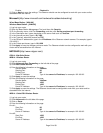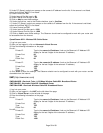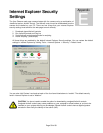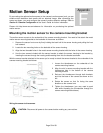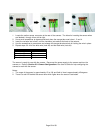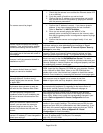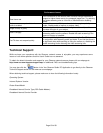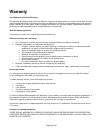
Page 66 of 69
Glossary
Term Explanation Relates to camera how
802.11b IEEE standard for wireless networking devices.
Wireless Observers are
interoperable with 802.11b devices.
Ad-Hoc
Peer to peer network. Method for directly connecting
devices on a wireless network to each other without
an access point. Each device must use a static IP.
You can connect to a Wireless
Observer directly from a PC with a
wireless network interface card
using Ad-Hoc mode.
DDNS
Dynamic Domain Name System. DNS service which
self-updates periodically to deal with changing IP
addresses.
If you don’t have a static IP address,
you need a DDNS to simplify
remote access.
DHCP
Dynamic Host Configuration Protocol. Allows
network connected devices to set their IP address,
default gateway, and subnet mask automatically.
Most home networking routers support DHCP.
Allows camera to auto configure for
a network.
Display size
The number of pixels used to display an image on
your monitor. Display size may be different than
image resolution.
The small, medium, and large
buttons on the main page change
this setting.
DNS
Domain Name System. Lookup service that
translates domain names into IP addresses.
If you want to access cameras by
convenient name instead of an IP
address, you need to register a
domain name.
Gateway
A device which connects one network to another. Provides Internet connection.
Gateway-Router
A combination device that allows multiple devices on
a LAN to connect to the Internet using one WAN IP
address. Most home networking routers are also
gateways.
Provides the network to connect
cameras and allows cameras to be
connected to the Internet.
Image resolution The number of pixels captured in an image.
Found on the settings web page.
IP address
Unique number used to identify each device on a
TCP/IP network.
Each camera must have a unique IP
address.
ISP Internet Service Provider
Provides your WAN IP address for
Internet access.
LAN
Local Area Network. A group of computers, printers,
cameras, and other network connected devices
which share a common network address such as
192.168.0.X
Cameras must be attached to a
LAN.
LAN IP address
Term used to differentiate a local address from the
WAN IP address used by a gateway router.
Camera use a LAN IP address to
communicate with your LAN.
MAC address
Media Access Control address. A unique hardware
identifier for each network device.
Allows the network to distinguish
between multiple cameras on the
network, similar to a serial number.
NAT
Network Address Translation. The process of
“translating” one WAN IP address into multiple LAN
IP addresses. Most home networking routers user
NAT to create LAN IP addresses.
Translated addresses cannot be
seen directly from the Internet. Port
forwarding is required.
Network address
The first 9 digits of the IP address of any device
connected to a TCP/IP LAN. You can find out your
network address by checking the IP address of any
PC on the network.
Combine the three digits on the
camera display with your network
address to get the camera’s full IP
address.
Router A device that routes traffic on a network. Provides LAN infrastructure.



